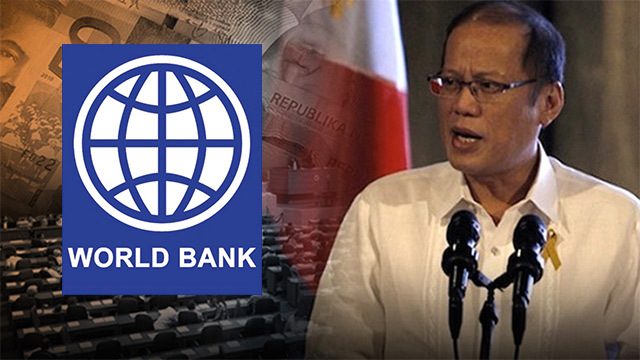SUMMARY
This is AI generated summarization, which may have errors. For context, always refer to the full article.

MANILA, Philippines (UPDATED) – The World Bank cut its growth forecast for the country in 2015 to 6.5%, following a 2014 downgrade, the multilateral organization reported Monday, April 13.
In October 2014, the Washington-based lender revised its growth outlook for the Philippines to 6.7%, down from 6.9% for 2015.
The Philippines is still one of the countries that is projected to grow faster in 2015 and 2016 than it did in 2014, said Sudhir Shetty, World Bank chief economist for East Asia and Pacific.
Despite this, World Bank projections for the next two years are less than the government’s projection of 7 % to 8%.
The latest growth forecast of 6.5% is also projected to carry over to 2016, but seen to decelerate to 6.3% by 2017.
“Our judgment is that there will be a boost from 2014 due to lower oil prices, however there are still constraints around infrastructure and the capital spending of the government and how fully that will be completed,” Shetty said.
Growth prospects for PH
The country’s gross domestic product (GDP) hit 6.1% in 2014, lower than the WB’s earlier calculation of 6.4%.
The downgrade was because the government spent less in the third quarter of 2014, Karl Kendrik Chua, World Bank’s senior economist in the Philippines earlier said.
The government’s limited opportunities to raise spending in the final quarter of 2014 was also attributed to the lending agency’s reduced forecast, Chua added.
The growth would pick up if the Philippine government executes its budget and super typhoon Yolanda master plan, World Bank noted.
Reductions in underemployment and well-targeted social transfers also helped lower the poverty rate from 15.4% in 2012 to 14.2 in 2013.
“This trend can be sustained if the government continues to increase investments in infrastructure, health, and education; boosts competition in the economy; simplifies regulations for doing business, especially for small and medium enterprises (SMEs);and secures property rights for the majority of the population,” World Bank said.
Growth forecasts
For East Asia and the Pacific this year, the World Bank forecasts that economic growth will ease slightly in developing countries, even as the region benefits from lower oil prices and continued economic recovery in developed countries, according to the East Asia Pacific Economic Update released Monday by the World Bank.
Economies that rely on oil imports or fuel subsidies such as Indonesia, Thailand and the Philippines, are seen to gain significantly from the falling oil prices, which could remain up to 45% lower in 2015 and may rise “only modestly” in 2017, World Bank noted.
The developing economies of East Asia are projected to grow by 6.7% in 2015 and 2016, slightly down from 6.9% in 2014, World Bank added.
China’s growth is also expected to moderate to around 7% in the next two years compared with 7.4% in 2014, attributed to policy efforts addressing financial vulnerabilities and achieve sustainable growth.
The World Bank on the whole, is cautiously optimistic on developing East Asia Pacific, as growth in the region is still robust, even though it is no longer the fastest growing due to India’s surge which crowned South Asia as the fastest growth region in the world, Shetty said.
The World Bank also remains cautious due in part to the many risks present in the global economy.
Shetty added that policy makers across the region are aware of them and they will have to continue to guard against them.
“In that respect, the oil price decline provides a great opportunity to do things on the fiscal side that are both good in the short run and the medium term in addressing the problems faced by the region,” he said. – with a report from Chris Schnabel / Rappler.com
Add a comment
How does this make you feel?





There are no comments yet. Add your comment to start the conversation.